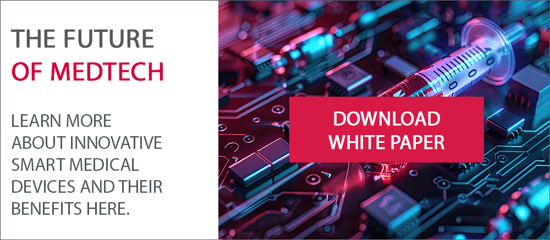In recent years, digitalization has affected almost all areas of life - and the healthcare sector is no exception. Smart medical devices promise more efficient, more accurate and more patient-friendly healthcare. But what challenges need to be overcome in order to take advantage of the opportunities? And how can manufacturers position themselves successfully in this market?
Smart medical devices are medical devices that are equipped with sensors, artificial intelligence (AI) and wireless communication. They record and analyze health data in real time, enable more precise diagnostics and support medical professionals and patients in their everyday lives. From wearables such as smartwatches that monitor heart rhythms to intelligent insulin pumps and AI-supported diagnostic systems, they offer a wide range of opportunities to improve the quality of preventive and curative healthcare, make work processes more efficient and reduce costs.
Benefits for patients and the healthcare system
Innovative medical technology not only benefits patients, but can also promote positive effects for the healthcare system in general. These include
1. Preventive medicine and early detection
Thanks to continuous data collection, smart medical devices enable the early detection of diseases. For example, cardiovascular diseases, diabetes or neurological disorders can be identified and treated more quickly thanks to regular monitoring. This not only increases the chances of survival, but also improves the quality of life of many patients.
2. Personalized treatment
By intelligently analyzing collected data, doctors can create individual treatment plans. For example, smart insulin pumps adjust the dosage in real time to the current blood sugar levels, giving patients more stable control over their disease.
3. Easing the burden on the healthcare system
Remote monitoring and telemedicine reduce the need for physical visits to the doctor, which is particularly beneficial for chronically ill or elderly people. This not only saves time and money for patients, but also relieves the burden on doctors and hospitals.
4. Better patient self-management
Many smart medical devices are linked to mobile apps that help patients to track their health data and make informed decisions. This increases personal responsibility and motivation for a healthy lifestyle.
Hurdles on the road to success
However, these opportunities are offset by a number of challenges and unanswered questions that need to be overcome on the way to successful implementation. These include, for example
1. Data protection and cyber security
With the digital processing of sensitive health data, concerns about data protection and IT security are growing. Who has access to the data? How is it protected? Increasing networking makes smart medical devices vulnerable to cyberattacks, which is why strict security standards are necessary.
2. Regulatory hurdles
In Europe, smart medical devices are subject to strict regulations, in particular the EU Medical Device Regulation (MDR). Manufacturers must prove that their devices are safe and reliable before they are placed on the market. This process can be lengthy and costly.
3. Technical challenges and interoperability
Devices from different manufacturers must communicate seamlessly with each other to ensure efficient healthcare. Uniform standards and interfaces are crucial to enable broad integration into existing systems. In addition, numerous standards specifically for medical devices must be complied with, for example on functional safety and IT security, quality and risk management, usability and the software life cycle processes of medical devices.
4. Acceptance by doctors and patients
While some patients are enthusiastic about the possibilities, there is also skepticism about the new technology. It is therefore essential that smart medical devices are easy to use, but also that patients are well trained in their use. Doctors need additional training in order to integrate the collected data into treatment in a meaningful way.
Numerous different skills required
The digitalization and networking of medical devices, the addition of apps and AI, constantly changing regulatory requirements, which in turn are driven by technical innovations in this area, as well as new materials and development and production processes - all of these require specific skills. Bringing all of these together under one roof and keeping them constantly available is difficult to achieve on the one hand and not necessarily efficient on the other.
It therefore makes sense to rely on external partners who can provide additional human resources and contribute specific expertise. However, the question arises as to how to find suitable partners who have both the know-how and practical experience, as well as the right attitude in terms of high quality and reliability - essential characteristics for medical devices that must be proven in a defined approval process before the product can be launched on the market.
Combination of "Skills & Attitude"
One possible cooperation partner is the EDAG Group, which is also represented in the medical sector as a development service provider for various vertical markets. The broad positioning, with development engineers, software and AI experts, specialists for production planning and optimization and many other areas, means that practically all competencies that are required in development projects relating to smart medical devices can be covered.
In addition, the EDAG experts are also trained to think along with related disciplines and to involve the respective colleagues, so that it is ensured that the desired development is not one-sidedly focused on a single objective, but that the various requirements are considered and processed in an integrated problem-solving process.
This goes so far as to pursue a holistic approach that considers the requirements of a product from several perspectives:
- Smart product: the key characteristics and objectives of the product;
- Smart Factory: Considerations for automated production with efficient workflows and sustainable use of resources;
- Smart People: Easy handling of the device and the associated software, innovative training approaches for patients and private users as well as doctors and other medical staff, and
- Smart Ecosystem: The integration of products and services, the networking of patients and doctors, optimizing availability and ensuring maintenance are some of the most important aspects of this approach.

For the EDAG developers, patient health and product safety are always paramount. This is guaranteed by comprehensive quality management, which accompanies all processes in the development of a medical device. This applies to individual components, the software and the equipment.
Conclusion
The development of smart medical devices offers a wide range of benefits that promise users support for preventive healthcare, better early detection in the event of illness, new and higher-quality therapies and, last but not least, greater efficiency in the healthcare system.
Equipment manufacturers face numerous challenges along the way. With experts in all the required disciplines, EDAG can offer support in many different areas. They are characterized by practical experience and an "integrated mindset" that takes into account the different requirements, but also by a strict focus on product quality, safety and reliability.
What are your concerns in the development of smart medical devices? Support with development, questions about efficient and sustainable production, ideas for usability and user training, ensuring security and data protection, support with documentation and approval processes...? Then talk to Michael Kelnberger, Sales Manager Technical Sales, about your use case. Or download our white paper "Smart Medical Devices - Basics of secure and efficient development" right here. Here you can find out more details about the various dimensions of the integrated development approach of the EDAG experts and how these are reflected in specific use cases. 





